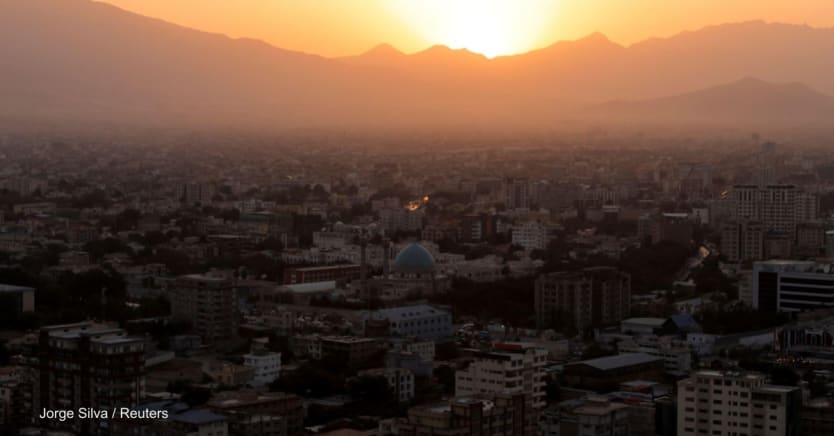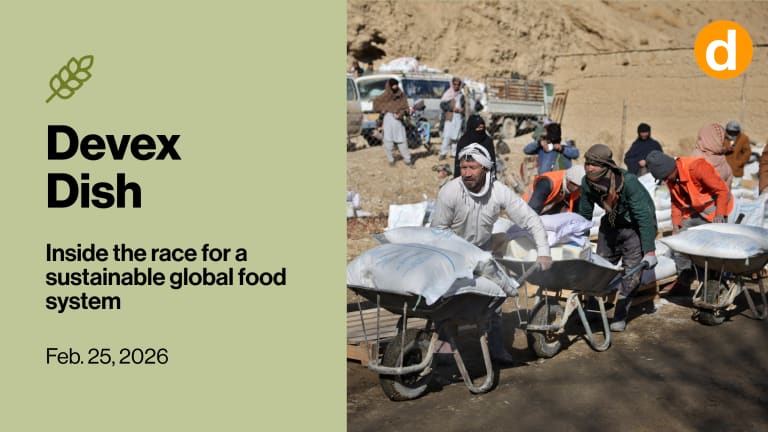
The European Commission is asking European Union states to endorse the resumption of limited development work in Afghanistan, on the condition that it be carried out by NGOs and international organizations, not via the Taliban.
EU development ministers will meet Monday for an informal videoconference to discuss the commission proposal, which was seen by Devex. Titled “Towards a EU approach in support of the Afghan People,” the document proposes a progressive way to restart funding initiatives that go beyond purely humanitarian work.
The EU has maintained basic aid, such as the delivery of medical supplies, since the Taliban took over the country in August, though it joined other donors in halting longer-term development programs.
In the short term, the latest commission proposal argues, “Development projects and international trust funds that were ongoing before 15 August 2021 should be allowed to resume (after reorientation of activities, where needed) if the following criteria are met:
• implemented by NGOs or international organisations;
• benefitting directly the population, local CSOs [civil society organizations] and human rights’ defenders;
• addressing basic needs of the population, livelihoods, displacement dynamics, human rights including women’s rights, and/or civil society empowerment; and
• remaining relevant and operationally feasible in the new context.”
Also in the short term, the plan says, “Development projects that cannot be reoriented should be suspended or terminated”; “Regional dynamics should be addressed and neighbouring countries supported in hosting Afghan refugees”; and “Additional projects with other funding sources, notably humanitarian operations, will be considered.”
In early October, the commission’s aid department said that its humanitarian assistance — which it upped from €57 million to €200 million in the wake of the Taliban coming to power — has focused on “health care, nutritional support, cash and protection assistance, including areas not reached by government structures.”
However, Josep Borrell, the bloc’s foreign affairs chief, warned that the international community must do more to avoid a “humanitarian catastrophe” in Afghanistan. Borrell also reiterated the five benchmarks set by EU states in September for future engagement with the Taliban government, including that it “Promote, protect and respect all human rights, in particular the full enjoyment of rights of women and girls” and “Establish an inclusive and representative government through negotiations.”
Speaking to Devex on condition of anonymity Friday, a senior EU official conceded that the benchmarks were not being fully met by the new government but that United Nations agencies and others in the country were reporting “an urgent need to go beyond humanitarian aid and towards development.”
“There is a need to achieve the right balance,” the commission plan states, “responding to urgent needs and avoiding a total collapse of the country – retaining some leverage and without legitimising, recognising or supporting the Taliban regime.”
In the short to medium term, the commission plan envisages that “the EU and its Member States, working together with international partners and through UN agencies and possibly the World Bank, would aim at reaching Afghans directly, paying particular attention to the rights of women and girls, as well as children and persons belonging to minorities,” adding that “Implementing partners on the ground would be primarily international organisations and international NGOs.”
Meanwhile, in the medium to long term, “A joint approach on how to apply the benchmarks and monitor their impact will be needed before being able to deliver development assistance beyond the activities outlined above,” the plan states.
The distinction between development assistance and humanitarian aid is notoriously blurry — as reflected in the frequently ridiculed discussions on the humanitarian-development-peace nexus. However, the EU official said it was clear that direct assistance to the Taliban — such as budget support — or major infrastructure projects would not be immediately considered under the proposed changes.
Even so, the official said that merely by funding NGOs’ work in health and education, the EU would be “doing what the government should be doing and therefore indirectly creating room for [the Taliban].”
It was unclear if the debate would be resolved on Monday’s video call, the official added, while noting the importance of trying to reach a joint EU position ahead of a meeting on Afghanistan among the G-20 group of nations Tuesday.








